Provisional government
A provisional government, also called an interim government, an emergency government, a transitional government or provisional leadership,[1] is a temporary government formed to manage a period of transition, often following state collapse. Provisional governments are generally appointed, and frequently arise, either during or after civil or foreign wars, or during difficult times such as during invasion, economic crisis, or widespread infiltration of saboteurs and counter-revolutionaries such as during the French Revolution.
| Part of the Politics series |
| Basic forms of government |
|---|
| List of forms of government |
|
|
Provisional governments maintain power until a new government can be appointed by a regular political process, which is generally an election.[2] They may be involved with defining the legal structure of subsequent regimes, guidelines related to human rights and political freedoms, the structure of the economy, government institutions, and international alignment.[3] Provisional governments differ from caretaker governments, which are responsible for governing within an established parliamentary system and serve as placeholders following a motion of no confidence, or following the dissolution of the ruling coalition.[3]
In opinion of Yossi Shain and Juan J. Linz, provisional governments can be classified to four groups:[4]
- Revolutionary provisional governments (when the former regime is overthrown and the power belongs to the people who have overthrown it).
- Power sharing provisional governments (when the power is shared between former regime and the ones who are trying to change it).
- Incumbent provisional governments (when the power during transitional period belongs to the former regime).
- International provisional governments (when the power during the transitional period belongs to the international community).
The establishment of provisional governments is frequently tied to the implementation of transitional justice.[5] Decisions related to transitional justice can determine who is allowed to participate in a provisional government.
The early provisional governments were created to prepare for the return of royal rule. Irregularly convened assemblies during the English Revolution, such as Confederate Ireland (1641–49), were described as "provisional". The Continental Congress, a convention of delegates from 13 British colonies on the east coast of North America became the provisional government of the United States in 1776, during the American Revolutionary War. The government shed its provisional status in 1781, following ratification of the Articles of Confederation, and continued in existence as the Congress of the Confederation until it was supplanted by the United States Congress in 1789.
The practice of using "provisional government" as part of a formal name can be traced to Talleyrand's government in France in 1814. In 1843, American pioneers in the Oregon Country, in the Pacific Northwest region of North America established the Provisional Government of Oregon—as the U.S. federal government had not yet extended its jurisdiction over the region—which existed until March 1849. The numerous provisional governments during the Revolutions of 1848 gave the word its modern meaning: A liberal government established to prepare for elections.
List of provisional governments
Numerous provisional governments have been established since the 1850s.
Africa
As of 2023 in Africa, South Sudan, Libya, Sudan, Burkina Faso, Chad, Guinea, Mali, Niger and Gabon currently have provisional governments.
.svg.png.webp) Provisional Government of the Algerian Republic (1958–62) (guerrilla movement)
Provisional Government of the Algerian Republic (1958–62) (guerrilla movement).svg.png.webp) Transitional Government of National Unity (Namibia) (1985–1989), interim government during the end of the South African Border War
Transitional Government of National Unity (Namibia) (1985–1989), interim government during the end of the South African Border War.svg.png.webp) Transitional Government of Ethiopia (1991–1995), established after the end of the Ethiopian Civil War
Transitional Government of Ethiopia (1991–1995), established after the end of the Ethiopian Civil War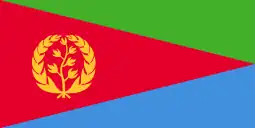 Provisional Government of Eritrea (1993), established after independence from Ethiopia
Provisional Government of Eritrea (1993), established after independence from Ethiopia Transitional Government of the Democratic Republic of the Congo (2003–2006), established in 2003 following the conclusion of the Second Congo War
Transitional Government of the Democratic Republic of the Congo (2003–2006), established in 2003 following the conclusion of the Second Congo War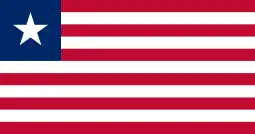 National Transitional Legislative Assembly of Liberia (2003–2006), Liberia's legislative body during the country's transition from civil war to democratic rule
National Transitional Legislative Assembly of Liberia (2003–2006), Liberia's legislative body during the country's transition from civil war to democratic rule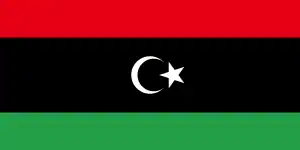 National Transitional Council of Libya (2011–2012), formed during the 2011 civil war in Libya against the Gaddafi-led government
National Transitional Council of Libya (2011–2012), formed during the 2011 civil war in Libya against the Gaddafi-led government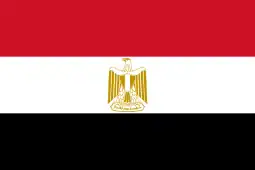 Interim government of Egypt (2013–2014), established following the June 2013 Egyptian protests and subsequent coup
Interim government of Egypt (2013–2014), established following the June 2013 Egyptian protests and subsequent coup The UN-supported Government of National Unity In Libya (2021–present), formed following the Libyan Political Dialogue Forum in Sirte
The UN-supported Government of National Unity In Libya (2021–present), formed following the Libyan Political Dialogue Forum in Sirte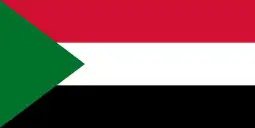 Sovereignty Council of Sudan (2019–2021, 2021–present), established in August 2019 after 8 month-long protests against President Bashir and a subsequent military coup
Sovereignty Council of Sudan (2019–2021, 2021–present), established in August 2019 after 8 month-long protests against President Bashir and a subsequent military coup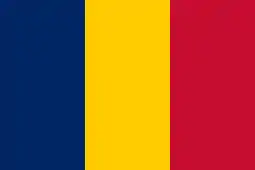 National Transitional Council in Chad (2022–present), replaced the Transitional Military Council in 2022.
National Transitional Council in Chad (2022–present), replaced the Transitional Military Council in 2022.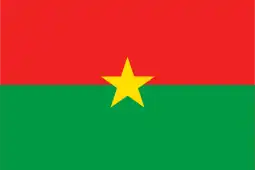 Patriotic Movement for Safeguard and Restoration in Burkina Faso (2022-present),formed on the 24 of January 2022 the group took over after a coup in January. The leader Paul-Henri Sandaogo Damiba suffered a coup himself. After that, Ibrahim Traroé took power as the leader of the group and interim president of Burkina Faso.
Patriotic Movement for Safeguard and Restoration in Burkina Faso (2022-present),formed on the 24 of January 2022 the group took over after a coup in January. The leader Paul-Henri Sandaogo Damiba suffered a coup himself. After that, Ibrahim Traroé took power as the leader of the group and interim president of Burkina Faso.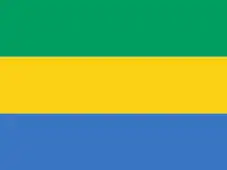 Committee for the Transition and Restoration of Institutions (August 2023-present).
Committee for the Transition and Restoration of Institutions (August 2023-present).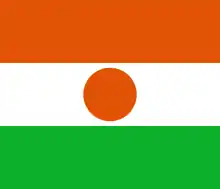 National Council for the Safeguard of the Homeland (CNSP) (July 2023-present).
National Council for the Safeguard of the Homeland (CNSP) (July 2023-present).
Americas
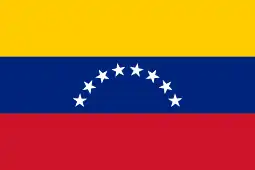 Venezuelan transitional government (2019–2022), established in January 2019 by the National Assembly led by Juan Guaidó, currently in dispute with the incumbent government of the Bolivarian Republic of Venezuela led by Nicolás Maduro. The transitional government is supported and recognized by United States, European Union, Lima Group, and many other Western countries
Venezuelan transitional government (2019–2022), established in January 2019 by the National Assembly led by Juan Guaidó, currently in dispute with the incumbent government of the Bolivarian Republic of Venezuela led by Nicolás Maduro. The transitional government is supported and recognized by United States, European Union, Lima Group, and many other Western countries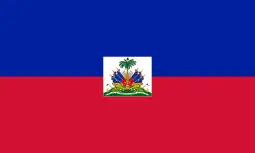 National Council of Government (1986–1988), interim ruling body of Haiti, after the departure of Jean-Claude Duvalier
National Council of Government (1986–1988), interim ruling body of Haiti, after the departure of Jean-Claude Duvalier
Asia
.svg.png.webp) Revolutionary Government of the Philippines (1898–1899), established in the Spanish East Indies
Revolutionary Government of the Philippines (1898–1899), established in the Spanish East Indies.svg.png.webp) Provisional Government of the Republic of China (1912), established after the success of the Wuchang uprising.
Provisional Government of the Republic of China (1912), established after the success of the Wuchang uprising.
World War I and Interbellum
- Provisional Government of India (1915), established in Kabul.
- Republic of Van (1915), established in Western Armenia.
 South West Caucasian Republic (1919), established in Kars.
South West Caucasian Republic (1919), established in Kars.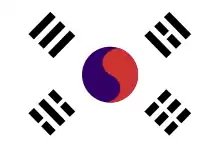 Provisional Government of the Republic of Korea (1919), established in exile based in Shanghai, China and later in Chongqing, during the Japanese occupation of Korea.
Provisional Government of the Republic of Korea (1919), established in exile based in Shanghai, China and later in Chongqing, during the Japanese occupation of Korea..svg.png.webp) Government of the Grand National Assembly (1920-1923), established as an alternative government to the Allied-occupied Ottoman Empire during the Turkish War of Independence
Government of the Grand National Assembly (1920-1923), established as an alternative government to the Allied-occupied Ottoman Empire during the Turkish War of Independence
World War II
.svg.png.webp) Provisional Government of the Republic of China (1937–40), established by the Empire of Japan when invading Eastern China.
Provisional Government of the Republic of China (1937–40), established by the Empire of Japan when invading Eastern China.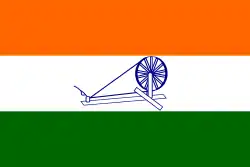 Provisional Government of Free India (1943–1945), commonly known as Azad Hind, established by Indian nationalists in southeast Asia, had nominal sovereignty over Axis controlled Indian territories, and had diplomatic relationships with eleven countries including Germany, Italy, Japan, Philippines, and the Soviet Union. It was headed by Netaji Subhas Chandra Bose, who was the Head of the State and Prime Minister, who was also the Supreme Commander of the Indian National Army. The government had its own cabinet and banks. It was also the first government to recruit women for combat roles.
Provisional Government of Free India (1943–1945), commonly known as Azad Hind, established by Indian nationalists in southeast Asia, had nominal sovereignty over Axis controlled Indian territories, and had diplomatic relationships with eleven countries including Germany, Italy, Japan, Philippines, and the Soviet Union. It was headed by Netaji Subhas Chandra Bose, who was the Head of the State and Prime Minister, who was also the Supreme Commander of the Indian National Army. The government had its own cabinet and banks. It was also the first government to recruit women for combat roles.
Cold War and aftermath
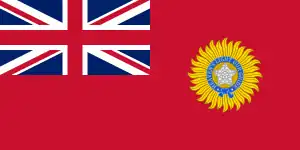 Interim Government of India (1946–1947), an interim government formed by the newly created Constituent Assembly of India to administer what would become the Dominion of India and the Dominion of Pakistan in the transitional period between British rule and independence.
Interim Government of India (1946–1947), an interim government formed by the newly created Constituent Assembly of India to administer what would become the Dominion of India and the Dominion of Pakistan in the transitional period between British rule and independence.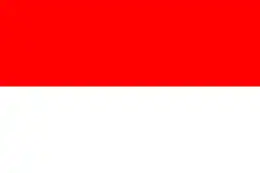 Emergency Government of the Republic of Indonesia (1948–1949), an emergency government established by Sjafruddin Prawiranegara in Sumatra following the capture of Yogyakarta, the then-Indonesian capital, by the Netherlands.
Emergency Government of the Republic of Indonesia (1948–1949), an emergency government established by Sjafruddin Prawiranegara in Sumatra following the capture of Yogyakarta, the then-Indonesian capital, by the Netherlands. Provisional government of Israel (1948–1949), established after Israel's declaration of independence and in place until after the first Knesset elections.
Provisional government of Israel (1948–1949), established after Israel's declaration of independence and in place until after the first Knesset elections.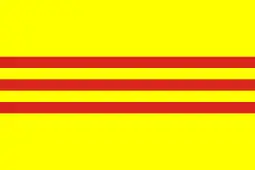 Provisional Central Government of Vietnam (1948-1949), established as a puppet government by French during the First Indochina War.
Provisional Central Government of Vietnam (1948-1949), established as a puppet government by French during the First Indochina War.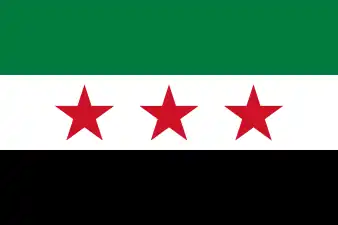 Provisional Government of the Syrian Arab Republic (1949), established by national consensus to draft a new constitution and reintroduce civilian rule after a series of military governments.
Provisional Government of the Syrian Arab Republic (1949), established by national consensus to draft a new constitution and reintroduce civilian rule after a series of military governments.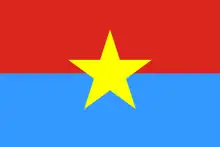 Provisional Revolutionary Government of the Republic of South Vietnam (1969–1976), established during the Vietnam War against the United States and Republic of Vietnam
Provisional Revolutionary Government of the Republic of South Vietnam (1969–1976), established during the Vietnam War against the United States and Republic of Vietnam.svg.png.webp) Provisional Government of the People's Republic of Bangladesh (1970–1972), established after the declaration of freedom of Bengalis exiled to Calcutta.
Provisional Government of the People's Republic of Bangladesh (1970–1972), established after the declaration of freedom of Bengalis exiled to Calcutta..svg.png.webp) Interim Government of Iran, a provisional government established after the 1979 Iranian Revolution
Interim Government of Iran, a provisional government established after the 1979 Iranian Revolution.svg.png.webp) Democratic Republic of Iran, formed in 1981 by the People's Mujahedin of Iran based in Paris and later Albania. It serves as the main Iranian government-in-exile opposing the clerical government.
Democratic Republic of Iran, formed in 1981 by the People's Mujahedin of Iran based in Paris and later Albania. It serves as the main Iranian government-in-exile opposing the clerical government..svg.png.webp) Provisional Government of the Philippines (1986–1987), established after the People Power Revolution until the new constitution ratified
Provisional Government of the Philippines (1986–1987), established after the People Power Revolution until the new constitution ratified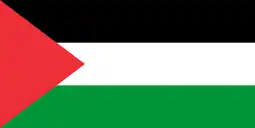 Executive Committee of the Palestine Liberation Organization (1988–), after it was entrusted with the powers and responsibilities of the Provisional Government of the State of Palestine.[6][7]
Executive Committee of the Palestine Liberation Organization (1988–), after it was entrusted with the powers and responsibilities of the Provisional Government of the State of Palestine.[6][7].svg.png.webp) United Nations Transitional Authority in Cambodia (1992–1993)
United Nations Transitional Authority in Cambodia (1992–1993) Palestinian National Authority (1994–2013), the administrative organization, established to govern parts of the West Bank and Gaza Strip, following the Oslo Accords.[8]
Palestinian National Authority (1994–2013), the administrative organization, established to govern parts of the West Bank and Gaza Strip, following the Oslo Accords.[8]
21st century
As of 2023 in Asia, Afghanistan, Myanmar, Syria, and Yemen currently have provisional governments. The Syrian provisional governments are opposition groups in rebellion against their internationally-recognized government. Afghanistan's provisional government is unrecognized, but is de facto the country's sole governing body. Myanmar and Yemen have both ruling and opposition provisional governments.
.svg.png.webp) Coalition Provisional Authority in Iraq (2003–2004) with the Iraqi Interim Governing Council, established to act as a caretaker administration in Iraq following the 2003 invasion of Iraq pending the hand over of power to the Iraqi people and the creation of a democratically elected civilian government.
Coalition Provisional Authority in Iraq (2003–2004) with the Iraqi Interim Governing Council, established to act as a caretaker administration in Iraq following the 2003 invasion of Iraq pending the hand over of power to the Iraqi people and the creation of a democratically elected civilian government..svg.png.webp) Iraqi Interim Government (2004–2005) and the Iraqi Transitional Government (2005–2006) were both provisional authorities established after the hand over of power to the Iraqi people following the 2003 invasion of Iraq to govern pending the adoption of a permanent constitution.
Iraqi Interim Government (2004–2005) and the Iraqi Transitional Government (2005–2006) were both provisional authorities established after the hand over of power to the Iraqi people following the 2003 invasion of Iraq to govern pending the adoption of a permanent constitution. Syrian Interim Government (2013–present), established by the Syrian National Coalition during the Syrian Civil War
Syrian Interim Government (2013–present), established by the Syrian National Coalition during the Syrian Civil War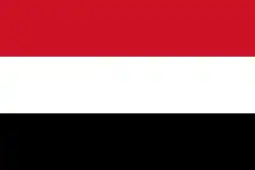 Supreme Political Council of Yemen (2015–present), established by the Houthi Movement after the 2014–15 Yemeni coup d'état, currently participating in the Yemeni Civil War (2014–present) against the governments of Abdrabbuh Mansur Hadi and the Presidential Leadership Council
Supreme Political Council of Yemen (2015–present), established by the Houthi Movement after the 2014–15 Yemeni coup d'état, currently participating in the Yemeni Civil War (2014–present) against the governments of Abdrabbuh Mansur Hadi and the Presidential Leadership Council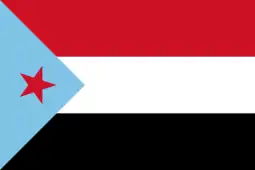 Southern Transitional Council of South Yemen (2016–present), established by the Southern Movement - a separatist group in southern Yemen - during the Yemeni Civil War (2014–present)
Southern Transitional Council of South Yemen (2016–present), established by the Southern Movement - a separatist group in southern Yemen - during the Yemeni Civil War (2014–present)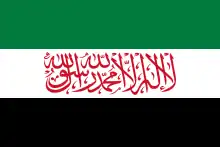 Syrian Salvation Government (2017–present), established by Hayat Tahrir al-Sham in the Idlib Governorate[9]
Syrian Salvation Government (2017–present), established by Hayat Tahrir al-Sham in the Idlib Governorate[9]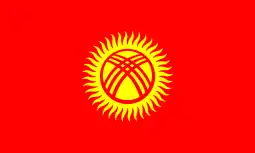 Interim government of Kyrgyzstan (2020–2021), established in 2020 in the aftermath of the 2020 Kyrgyzstani protests
Interim government of Kyrgyzstan (2020–2021), established in 2020 in the aftermath of the 2020 Kyrgyzstani protests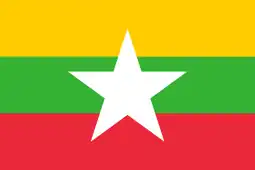 National Unity Government of Myanmar (2021–present), established in exile by the Committee Representing Pyidaungsu Hluttaw in opposition to the 2021 Myanmar coup d'état[10]
National Unity Government of Myanmar (2021–present), established in exile by the Committee Representing Pyidaungsu Hluttaw in opposition to the 2021 Myanmar coup d'état[10] Provisional Government of Myanmar (2021–present), established by the State Administration Council as a formalization of its rule six months after the 2021 Myanmar coup d'état[11]
Provisional Government of Myanmar (2021–present), established by the State Administration Council as a formalization of its rule six months after the 2021 Myanmar coup d'état[11]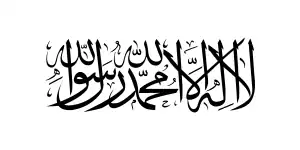 Caretaker Cabinet of the Islamic Emirate of Afghanistan (2021–present), established by the Taliban following the 2021 fall of Kabul[12][13]
Caretaker Cabinet of the Islamic Emirate of Afghanistan (2021–present), established by the Taliban following the 2021 fall of Kabul[12][13] Presidential Leadership Council (2022–present), established by internationally-recognized outgoing president Abdrabbuh Mansur Hadi to seek a "comprehensive political solution" to the Yemeni Civil War[14][15]
Presidential Leadership Council (2022–present), established by internationally-recognized outgoing president Abdrabbuh Mansur Hadi to seek a "comprehensive political solution" to the Yemeni Civil War[14][15]
Europe
.svg.png.webp) Provisional Government of Spain (1868–1871), established after the Spanish Glorious Revolution pending the election of a new Constitutional Monarch.
Provisional Government of Spain (1868–1871), established after the Spanish Glorious Revolution pending the election of a new Constitutional Monarch.
World War I and Interbellum
.svg.png.webp) Provisional Government of Albania (1912–14), established after the First Balkan War
Provisional Government of Albania (1912–14), established after the First Balkan War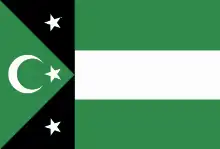 Provisional Government of Western Thrace (1913), established in modern Greece in opposition to annexation by Bulgaria during the Second Balkan War.
Provisional Government of Western Thrace (1913), established in modern Greece in opposition to annexation by Bulgaria during the Second Balkan War. Provisional Government of Northern Epirus (1914), established against annexation to Albania.
Provisional Government of Northern Epirus (1914), established against annexation to Albania.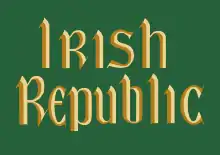 Provisional Government of the Irish Republic (1916), a title adopted by the leadership of the short-lived Easter Rising.
Provisional Government of the Irish Republic (1916), a title adopted by the leadership of the short-lived Easter Rising..svg.png.webp) Provisional Government of National Defence (northern Greece), 1916
Provisional Government of National Defence (northern Greece), 1916 Russian Provisional Government (1917), established as a result of the February Revolution which led to the abdication of Tsar Nicholas II.
Russian Provisional Government (1917), established as a result of the February Revolution which led to the abdication of Tsar Nicholas II. State of Slovenes, Croats and Serbs, established in 1918 as the unrecognized first incarnation of Yugoslavia and later merged with the Kingdoms of Serbia and Montenegro to form the Kingdom of Serbs, Croats, and Slovenes.
State of Slovenes, Croats and Serbs, established in 1918 as the unrecognized first incarnation of Yugoslavia and later merged with the Kingdoms of Serbia and Montenegro to form the Kingdom of Serbs, Croats, and Slovenes. Estonian Provisional Government (1918–1919).
Estonian Provisional Government (1918–1919). Latvian Provisional Government (1918–1920).
Latvian Provisional Government (1918–1920)..svg.png.webp) Ukrainian Provisional Government (1918).
Ukrainian Provisional Government (1918). Provisional Government of the Northern Region (1918-1920).
Provisional Government of the Northern Region (1918-1920). Provisional Government of Ireland (1922), established by the Anglo-Irish Treaty between the British government and Irish revolutionaries, in order to pave the way for the establishment of the Irish Free State in the same year.
Provisional Government of Ireland (1922), established by the Anglo-Irish Treaty between the British government and Irish revolutionaries, in order to pave the way for the establishment of the Irish Free State in the same year.
World War II
 Provisional Government of Lithuania (1941), established when Lithuanians overthrew the Soviet occupation during the June Uprising. It functioned briefly until Nazi Germany annexed the country.
Provisional Government of Lithuania (1941), established when Lithuanians overthrew the Soviet occupation during the June Uprising. It functioned briefly until Nazi Germany annexed the country..svg.png.webp) Provisional National Government of Hungary (1944–1945) (Ideiglenes Nemzeti Kormány).[16]
Provisional National Government of Hungary (1944–1945) (Ideiglenes Nemzeti Kormány).[16].svg.png.webp) Provisional Government of the Democratic Federal Yugoslavia (1945).
Provisional Government of the Democratic Federal Yugoslavia (1945)..svg.png.webp) French Committee of National Liberation (Comité Français de Libération Nationale, CFLN) (1943–44), set up in Algiers, then a part of metropolitan France.
French Committee of National Liberation (Comité Français de Libération Nationale, CFLN) (1943–44), set up in Algiers, then a part of metropolitan France..svg.png.webp) Provisional Government of the French Republic (GPRF) (1944–46), government of the provisional Republic until the establishment of the Fourth Republic.
Provisional Government of the French Republic (GPRF) (1944–46), government of the provisional Republic until the establishment of the Fourth Republic..svg.png.webp) Democratic Government of Albania (1944–46).
Democratic Government of Albania (1944–46)..svg.png.webp) Flensburg Government (1945), established following the suicides of Adolf Hitler and Joseph Goebbels during the closing days of the Third Reich.
Flensburg Government (1945), established following the suicides of Adolf Hitler and Joseph Goebbels during the closing days of the Third Reich.
Provisional governments were also established throughout Europe as occupied nations were liberated from Nazi occupation by the Allies.
Cold War
 Provisional Turkish Cypriot Administration[17] (1967-1971)
Provisional Turkish Cypriot Administration[17] (1967-1971)
Collapse of the USSR and aftermath
 Government of National Understanding, established in Czechoslovakia after the Velvet Revolution of 1989.
Government of National Understanding, established in Czechoslovakia after the Velvet Revolution of 1989..svg.png.webp) National Salvation Front, established in Romania after the fall of Nicolae Ceaușescu and the end of the Socialist Republic of Romania in 1989.
National Salvation Front, established in Romania after the fall of Nicolae Ceaușescu and the end of the Socialist Republic of Romania in 1989. Estonian Interim Government (1990–1992)
Estonian Interim Government (1990–1992)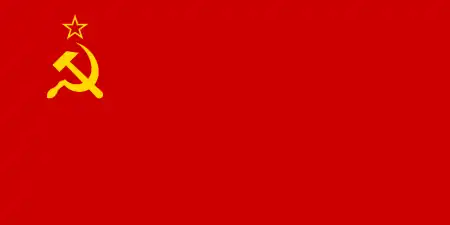 State Committee on the State of Emergency in the Soviet Union after the 1991 Soviet coup d'état attempt.
State Committee on the State of Emergency in the Soviet Union after the 1991 Soviet coup d'état attempt.
21st century
As of 2021 in Europe, Belarus is the only country currently with a provisional government, established by the opposition in parallel with the government of the Republic of Belarus.
.svg.png.webp) Belarusian Coordination Council (2020–present), established in the aftermath of the 2020 Belarusian presidential election and during subsequent protests. The transitional government is supported and recognized by Lithuania.
Belarusian Coordination Council (2020–present), established in the aftermath of the 2020 Belarusian presidential election and during subsequent protests. The transitional government is supported and recognized by Lithuania.
Oceania
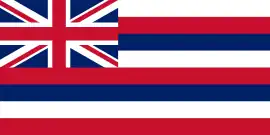 Provisional Government of Hawaii (1893-1894), established in 1893 after the overthrow of the Kingdom of Hawaii and renamed to the Republic of Hawaii in 1894.
Provisional Government of Hawaii (1893-1894), established in 1893 after the overthrow of the Kingdom of Hawaii and renamed to the Republic of Hawaii in 1894. 1901 caretaker government of Australia, established pending the first election to the newly established Commonwealth of Australia.
1901 caretaker government of Australia, established pending the first election to the newly established Commonwealth of Australia.
See also
References
- "Google Ngram Viewer". Archived from the original on 2019-06-08. Retrieved 2019-03-08.
- "caretaker government". Credo Reference. Dictionary of politics and government. Archived from the original on 1 June 2022. Retrieved 18 December 2015.
- Shain(1) Linz(2), Yossi(1) Linz(2) (January 1992). "The Role of Interim Governments". Journal of Democracy. 3: 73–79. doi:10.1353/jod.1992.0012. S2CID 153562287.
- Yossi Shain, Juan J. Linz, "Between States: Interim Governments in Democratic Transitions", 1995, ISBN 9780521484985 Archived 2018-03-13 at the Wayback Machine, p. 5
- McAuliffe, Padraig (1 September 2010). "Transitional Justice and the Rule of Law". Hague Journal of the Rule of Law. doi:10.1017/S1876404510200015. S2CID 154281455.
- Sayigh, Yezid (1999). Armed Struggle and the Search for State: The Palestinian National Movement, 1949–1993 (illustrated ed.). Oxford University Press. p. 624. ISBN 9780198296430. "The Palestinian National Council also empowered the central council to form a government-in-exile when appropriate, and the executive committee to perform the functions of government until such time as a government-in-exile was established."
- United Nations General Assembly Session 67 Resolution 19. A/RES/67/19 Retrieved 2013-01-07.
- "The Palestinian Authority". The New York Times. Archived from the original on 2013-07-21. Retrieved 2012-11-29.
- "Syria: Who's in control of Idlib?". BBC News. 2020-02-18. Archived from the original on 2019-07-27. Retrieved 2021-02-22.
- "Myanmar coup foes tout minority-backed shadow government". Associated Press. Yangon. 16 April 2021. Archived from the original on 18 March 2022. Retrieved 18 March 2022.
- "Myanmar shadow government condemns army ruler for taking PM role". Reuters. 2 August 2021. Archived from the original on 3 April 2022. Retrieved 18 March 2022.
- Choi, Joseph (8 September 2021). "EU: Provisional Taliban government does not fulfill promises". The Hill. Archived from the original on 18 March 2022. Retrieved 18 March 2022.
- "Statement of Islamic Emirate of Afghanistan regarding cabinet announcement". Islamic Emirate of Afghanistan – Voice of Jihad. 7 September 2021. Archived from the original on 5 December 2021. Retrieved 18 March 2022.
The Islamic Emirate has decided to appoint and announce a caretaker cabinet to undertake necessary governmental tasks.
- Salem, Mostafa; Kolirin, Lianne (7 April 2022). "Hopes of peace in Yemen as President hands power to new presidential council". CNN. Archived from the original on 8 April 2022. Retrieved 8 April 2022.
- Ghobari, Mohamed (7 April 2022). "Yemen president sacks deputy, delegates presidential powers to council". Reuters. Aden. Archived from the original on 1 May 2022. Retrieved 7 April 2022.
With this declaration a Presidential Leadership Council shall be established to complete the implementation of the tasks of the transitional period. I irreversibly delegate to the Presidential Leadership Council my full powers in accordance with the constitution and the Gulf Initiative and its executive mechanism.
- "The Provisional National Government (1945)". The Orange Files: Notes on Illiberal Democracy in Hungary. 3 December 2015. Archived from the original on 25 September 2017. Retrieved 20 March 2017.
- "Kuzey Kıbrıs Türk Cumhuriyeti Cumhuriyet Meclisi". Archived from the original on 2019-11-17. Retrieved 2019-11-17.